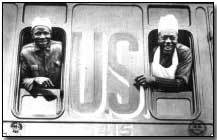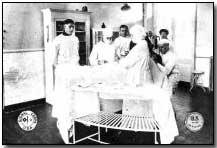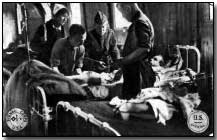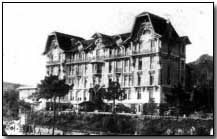Memoirs & Diaries - A Casualty Clearing Station
 In April 1918 I volunteered
to go to France in response to the urgent call for more surgeons. For
twenty years I had been in general practice in a suburb, and did a fair
amount of surgery among patients and at the local hospitals.
In April 1918 I volunteered
to go to France in response to the urgent call for more surgeons. For
twenty years I had been in general practice in a suburb, and did a fair
amount of surgery among patients and at the local hospitals.
I had also had some war experience as one of the surgeons at the British Red Cross Hospital, Netley, in the first six months of the War, but I had no experience of cases fresh from the battlefield, and the surgical technique which had recently been adopted in dealing with them.
I had been longing throughout the War to get to the Front, and I set out full of enthusiasm and with no little pride and satisfaction to my family and myself.
It was a great disappointment, after a wait of four days in Boulogne, to find that I was posted to a large Base hospital at Trouville. Here I remained till the beginning of July, not at all happy, and hampered at every turn by red tape, rules, and regulations.
The hospital was full of the wastage of war - men sent down from the Front, suffering from the ordinary diseases of civil life, which should have precluded their enlistment. The Front knocked them out almost at once, and they came to be patched up, to convalesce, and return.
The mess was full of rather war-weary men, who had endured much, and were glad of an easy berth. I had plenty of operating on ordinary civil-life disabilities, and, when not engaged in filling up "forms", enjoyed myself in field expeditions to collect butterflies and flowers, but the distant sound of guns was often disturbing.
Through the influence of a kind consulting surgeon at G.H.Q., and to my great delight, I was appointed early in July as a surgeon to a casualty clearing station at Crouay, near Amiens.
A greater contrast to a Base hospital could hardly be imagined. All military discipline, red tape, and formality were reduced to a minimum. Within the camp, officers donned flannels or shorts, and the mess, a dozen altogether, formed a family party; there were a small number of highly trained sisters, and forty or fifty orderlies.
The institution of these small mobile hospitals near the fighting line had revolutionized the surgery of the War, and was the means of saving thousands of lives. It was found that the fatal sepsis and gas gangrene of wounds could be avoided if effective operation was performed within thirty-six hours of their infliction, and all dead and injured tissue removed, in spite of the extensive mutilation incurred.
 The
essential parts of a C.C.S. were: (1) A large reception marquee. (2) A
resuscitation tent, where severely shocked or apparently dying cases were
warmed up in heated beds, or transfused before operation. (3) A
pre-operation tent, where stretcher cases were prepared for operation.
(4) A large operating tent with complete equipment for six tables. (5)
An evacuation tent, where the cases were sent after operation, to await the
hospital train for the Base. (6) Award tent for cases requiring
watching for twenty-four hours, or too bad for evacuation.
The
essential parts of a C.C.S. were: (1) A large reception marquee. (2) A
resuscitation tent, where severely shocked or apparently dying cases were
warmed up in heated beds, or transfused before operation. (3) A
pre-operation tent, where stretcher cases were prepared for operation.
(4) A large operating tent with complete equipment for six tables. (5)
An evacuation tent, where the cases were sent after operation, to await the
hospital train for the Base. (6) Award tent for cases requiring
watching for twenty-four hours, or too bad for evacuation.
I had two days to settle down, and get some idea of my new surroundings, and everyone was immensely kind, but I realized how entirely inexperienced I was in the work which would be required of me; my colleagues were all young men with two or three years' War service.
Vast reserves of men and transport had silently for two nights been moving up the road to Amiens to support the Australian attack at Villers-Bretonneux. On my third day I was orderly officer, and after my day's work had to be on duty all night as reception officer.
On that evening the attack began, with a continuous roar of heavy guns, while the horizon was brilliantly lit with the flashes of exploding dumps, Verey lights, and star shells. The camp was quietly resting, and I was left with a few orderlies in the dimly lit reception tent.
About 1 a.m. the ambulances began to arrive. It is impossible to convey an adequate picture of the scene. Into the tent are borne on stretchers, or come wearily stumbling, figures in khaki, wrapped in blankets or coats, bandaged or splinted. All of them stiff with mud, or caked with blood and dust, and salt sweat, and with labels of their injuries attached.
They come in such numbers that the tent is soon filled, and what can be done? I can't cope with them all! Many are white and cold, and lie still and make no response, and those who do are laconic, or point to their label. I have had no instructions how to dispose of such numbers, or the method of procedure, but realize that they must be examined briefly and sorted, and sent to one or other of our hospital tents.
But my non-com. orderly was at my side with whispered suggestions, and soon we had the stretchers on one side and the standing cases on the other, and, leaving the slighter cases to be dressed, I gradually sorted out the bad ones for the "resuss," "pre-op," or "evacuation" tents.
 I
had never seen such frightful wounds, and could not conceive how we three
surgeons could deal with them on the ensuing day. It was 7 a.m. before
I had cleared the tent, and I felt tired out after nearly twenty-four hours'
work, but at 10 a.m. I should have to begin to operate for another twelve
hours and on cases like these!
I
had never seen such frightful wounds, and could not conceive how we three
surgeons could deal with them on the ensuing day. It was 7 a.m. before
I had cleared the tent, and I felt tired out after nearly twenty-four hours'
work, but at 10 a.m. I should have to begin to operate for another twelve
hours and on cases like these!
It was extraordinary that in this charnel tent of pain and misery there was silence, and no outward expression of moans or groans or complaints. The badly shocked had passed beyond it; others appeared numbed, or too tired to complain, or so exhausted that they slept as they stood.
Even the badly wounded often asked for a smoke. Here were lying uncomplaining men with shattered heads or ghastly disfiguration of their faces, others with shell and bullet wounds of the chest, spitting blood and gasping for breath; and, worst of all, those quiet, afraid-to-be-touched cases, with the innocent tiny little mark where the bullet had entered the abdomen, but already with the thready pulse, drawn corners of the mouth, anxious look, and rigid muscles which betoken hopeless disaster within.
And here were "multiple wounded," their bodies riddled with large or small shell fragments, terrible compound fractures in Thomas's splints, and the stumps of tom-off limbs.
Well, I got a bath and some breakfast, and at ten o'clock began the operating: three of us at first, and later on in the day we were reinforced in response to S.O.S. calls by four visiting teams from distant C.C.S.'s each consisting of surgeon, anaesthetist, sister, and trained orderly.
As the day wore on I felt nearer and nearer to collapse. The appalling wounds, my ignorance of the new methods of dealing with them, the utter fatigue of standing at the table, and the growing feeling that my assistants must be noticing my incompetency began to take away all self-confidence.
I began to think of the bad luck of the wretched victims who came under my knife. How confidently they went under the ether, relying on my skill: how their lives and the happiness of their homes depended on me; how much better for them had fate brought them to the next table.
 Every
feeling and introspection that should never cross a surgeon's mind began to
possess me and shake my nerve, and it was only concentration on the actual
technique of the operation that kept me going. The hours dragged on.
Every
feeling and introspection that should never cross a surgeon's mind began to
possess me and shake my nerve, and it was only concentration on the actual
technique of the operation that kept me going. The hours dragged on.
Would the "Resuss" and "Pre-op" wards never be emptied. "Resuss!" "Pre-op!" - abbreviated words always to be fixed in memory with the haunting faces of their inmates.
"Resuss" was a dreadful place. Here were sent the shocked and collapsed and dying cases, not able to stand as yet an operation, but which might be possible after the warming-up under cradles in heated beds or transfusion of blood. The effect of transfusion was in some cases miraculous. I have seen men already like corpses, blanched and collapsed, pulseless and with just perceptible breathing, within two hours of transfusion sitting up in bed smoking, and exchanging jokes before they went to the operating table.
The orderly in the "Resuss" was a wonderful lad. A boy of twenty, he had served without relief for months in this tent, attending to the worst cases and the dying. He had all the patience, tenderness, and devotion of a woman, the gentle hands and skill of a nurse, and an enduring fortitude.
He was recommended for the D.S.M., but his best reward must be the memory of many a farewell message home, many a silent grasp of hand, and the last look of grateful eyes.
That dreadful day of my first experience of a C.C.S. rush ended at 7 p.m., after thirty-six hours of continuous work, and somehow I had got through. I was completely exhausted with anxiety and fatigue, and felt I could never go on with it, and was not up to the task: but to give in was even more terrible.
I could hardly articulate at dinner, but my condition escaped notice, and I crept to my tent to fall dead asleep before I could make a decision.
I woke refreshed on a glorious July day: we were encamped on cultivated down-land untouched by war, and the air was alive with the song of larks and the fields gay with poppies and marigolds and down flowers. The camp and country a picture of peaceful calm and beauty, if only one could forget the scene inside the tents.
 Fortunately,
there were only a few cases left by the night shift, and in the afternoon I
was able to leave the operating tent and get out among the birds and
butterflies and flowers.
Fortunately,
there were only a few cases left by the night shift, and in the afternoon I
was able to leave the operating tent and get out among the birds and
butterflies and flowers.
It was this walk, I think, which saved the situation for me. I got time, alone, to pull myself together, and though many times afterwards even worse rushes occurred and more terrible scenes were enacted, I never became overwhelmed with the same panic of my first experience.
That evening we took in nearly 200 Australians who had been caught by gas shells without their masks on. Entirely whitened with dust, every man was temporarily blinded and in agony with the difficulty of breathing from the mucous fluid in the lungs. It was a weird sight to see them led away through the camp in the moonlight, in long single files, holding on to each other and guided by an orderly as leader.
As the days wore on, I began to feel my self-confidence returning, and that I should be able to face another ordeal with more equanimity. The friendliness and camaraderie of our little mess was an immense help. I was popular and enjoyed it like a schoolboy.
I think they looked on me as an "old sport", and I had to live up to it. It was not long before I was again put to the test. Our C.C.S. was ordered to take up quarters with two others in a huge deserted asylum close to Amiens, in expectation of the grand attack of the IV Army around Villers-Bretolmeux, and for lack of transport we had not been able to complete our preparations before the attack began on the day after our arrival; nor had visiting teams, coming to our aid, yet arrived.
On that evening our barrage opened - a continuous roar of heavy guns which shook the ground, and trembled the walls of our building, and the sky and fields were lit up with the flashes and explosions of dumps and star shells. In the early hours of the morning came the ambulances in a continuous stream.
Quickly we took in our quota of 200 cases, and the "take-in" was "shunted" to the adjoining C.C.S. located in the same building, and within two hours to our third sister station. And then our turn began again, long before we had made any impression on the first lot.
 The
stretchers filled the numberless rooms, and then flowed out into the
corridors which became blocked except for a narrow passage. Every
unit, except those engaged with the nine operating surgeons, was occupied in
sorting, dressing, and doing what was possible for the masses of wounded,
but the numbers were too great and many had to lie for hours without help,
or die unattended.
The
stretchers filled the numberless rooms, and then flowed out into the
corridors which became blocked except for a narrow passage. Every
unit, except those engaged with the nine operating surgeons, was occupied in
sorting, dressing, and doing what was possible for the masses of wounded,
but the numbers were too great and many had to lie for hours without help,
or die unattended.
A quick surgeon might get through from fifteen to twenty cases in a spell of twelve hours. I certainly could not do more than ten or twelve. Among so many cases it was a sickening thing to have to make a choice for operation. We were dealing with a mass, not individuals, and if selection had to be made, it must be made in favour of those who by operation had a chance of being made fit again to return to the Front sooner or later to keep up our man power and afford fresh fodder for the guns.
In such circumstances nothing seemed to matter. It had to be got through somehow. Action, doing one's best, rightly or wrongly, mistakes or no mistakes, precluded all thought of self, and drove out fear and anxiety, and so I gained confidence as I tackled whatever came along on the table, or went down the "pre-op" rooms and chose out my cases - learning much from what I saw others were doing.
All that night and the following day, when the visiting teams began to arrive, we worked; night shifts took our places, and on the following morning, I went round the vast building to see what was happening. The wounded, including many Germans, had now overflowed from the rooms and corridors and were lying on stretchers in the open squares of the asylum.
Through the night, with dimmed lanterns, doctors and orderlies went down the rows doing what they could, but we were snowed under - and we could neither operate on nor evacuate cases fast enough to make much impression on the heaps.
 Many
of the Germans evidently dreaded they would meet with but rough treatment,
and, unable to make themselves understood, clasped our hands and with
imploring looks and despairing gestures tried to convey their meaning.
Except for precedence in operation it is perhaps needless to say they were
treated with the same care as our own men.
Many
of the Germans evidently dreaded they would meet with but rough treatment,
and, unable to make themselves understood, clasped our hands and with
imploring looks and despairing gestures tried to convey their meaning.
Except for precedence in operation it is perhaps needless to say they were
treated with the same care as our own men.
Entering an outbuilding, I found it strewn with rows of corpses - a human battue - and in another, a piled-up heap of arms and legs, freshly amputated. I write of these horrors, not for the sake of sensation, but to bring home the realities of war as I saw it, and the work and scenes in the three C.C.S.'s behind the fighting.
It took nearly a week before we had cleared up and evacuated the cases, and everyone was exhausted. It was clear that insufficient time had been given to the medical side to organize for the number of casualties that might be expected in a battle of this magnitude, and the exigencies of the fighting must have the first call on transport. It was probably unavoidable, but, the pity of it; and, after all, as old Caspar said, "It was a famous victory".
A lull in the fighting for a few days on our immediate front now ensued, and we had some rest, and I even went butterfly hunting, and on another day went up to the Front, and saw our guns firing, and heard the German shells coming over and bursting.
I remember, too, one night we had to spend operating on a number of men, brought in dressed up for theatricals, some of them as girls in ballet costume. A German aeroplane had dropped a bomb through the tent on to the stage, and the tent had collapsed on top of the crowded audience and the dead and wounded.
It was these violent contrasts that, to me, make up the vivid memories of my days in France. Outside, the sun and the larks, the birds, butterflies, and flowers: inside the tents, Nature violated, outraged - and alternating with the dread and anxiety and physical and mental exhaustion was the happy mess and bridge, picnics, and concerts.
It seemed hardly real at the time. It is fast becoming a dream, and, though I had many other experiences, as our C.C.S. followed the advance, at Albert and Brie and Peronne, Roiselle, and Bellenglise, none remain in my memory like those of my first "blooding" at Cronay and Amiens, where I came so near to collapse and disaster.
John A. Hayward. M.D., F.R.C.S. 1914-1915. Assistant-Surgeon (rank. Captain) British Red Cross Hospital, Netley. 1915-1917, Medical Officer, Queen Alexandra Hospital, Roehampton. April to November 1918, Temporary Captain R.A.M.C., B.E.F.
First published in Everyman at War (1930), edited by C. B. Purdom.
Photographs courtesy of Photos of the Great War website.
Duck-Boards comprised slatted wooden planking used for flooring trenches or muddy ground.
- Did you know?
